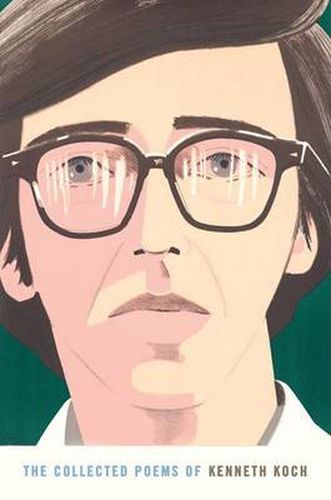Readings Newsletter
Become a Readings Member to make your shopping experience even easier.
Sign in or sign up for free!
You’re not far away from qualifying for FREE standard shipping within Australia
You’ve qualified for FREE standard shipping within Australia
The cart is loading…






Kenneth Koch has been called one of our greatest poetso by John Ashbery, and a national treasureo in the 2000 National Book Award Finalist Citation.
Now, for the first time, all of the poems in his ten collectionsufrom Sun Out, poems of the 1950s, to Thank You, published in 1962, to A Possible World, published in 2002, the year of the poet’s deathuare gathered in one volume. Celebrating the pleasures of friendship, art, and love, the poetry of Kenneth Koch has been dazzling readers for fifty years. Charter memberualong with Frank O'Hara, John Ashbery, and James Schuyleruof the New York School of poets, avant-garde playwright and fiction writer, pioneer teacher of writing to children, Koch gave us some of the most exciting and aesthetically daring poems of his generation. These poems take sensuous delight in the life of the mind and the heart, often at the same time: O what a physical effect it has on me / To dive forever into the light blue sea / Of your acquaintance!o ( In Love with Youo). Here is Koch’s early work: love poems like The Circuso and To Marinao and such well-remembered comic masterpieces as Fresh Air,o Some General Instructions,o and The Boiling Watero ( A serious moment for the water is when it boilso). And here are the brilliant later poemsu One Train May Hide Another,o the deliciously autobiographical address in New Addresses, and the stately elegy Bel Cantooupoems that, beneath a surface of lightness and wit, speak with passion, depth, and seriousness to all the most important moments in one’s existence. Charles Simic wrote in The New York Review of Books that, for Koch, poetry has to be constantly saved from itself. The idea is to do something with language that has never been done before.o In the ten exuberant, hilarious, and heartbreaking books of poems collected here, Kenneth Koch does exactly that.
$9.00 standard shipping within Australia
FREE standard shipping within Australia for orders over $100.00
Express & International shipping calculated at checkout
Kenneth Koch has been called one of our greatest poetso by John Ashbery, and a national treasureo in the 2000 National Book Award Finalist Citation.
Now, for the first time, all of the poems in his ten collectionsufrom Sun Out, poems of the 1950s, to Thank You, published in 1962, to A Possible World, published in 2002, the year of the poet’s deathuare gathered in one volume. Celebrating the pleasures of friendship, art, and love, the poetry of Kenneth Koch has been dazzling readers for fifty years. Charter memberualong with Frank O'Hara, John Ashbery, and James Schuyleruof the New York School of poets, avant-garde playwright and fiction writer, pioneer teacher of writing to children, Koch gave us some of the most exciting and aesthetically daring poems of his generation. These poems take sensuous delight in the life of the mind and the heart, often at the same time: O what a physical effect it has on me / To dive forever into the light blue sea / Of your acquaintance!o ( In Love with Youo). Here is Koch’s early work: love poems like The Circuso and To Marinao and such well-remembered comic masterpieces as Fresh Air,o Some General Instructions,o and The Boiling Watero ( A serious moment for the water is when it boilso). And here are the brilliant later poemsu One Train May Hide Another,o the deliciously autobiographical address in New Addresses, and the stately elegy Bel Cantooupoems that, beneath a surface of lightness and wit, speak with passion, depth, and seriousness to all the most important moments in one’s existence. Charles Simic wrote in The New York Review of Books that, for Koch, poetry has to be constantly saved from itself. The idea is to do something with language that has never been done before.o In the ten exuberant, hilarious, and heartbreaking books of poems collected here, Kenneth Koch does exactly that.